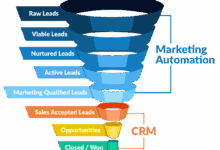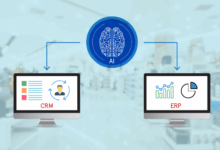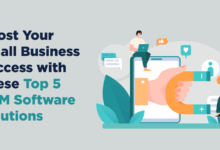CRM with AI Chatbot Integration: Enhanced Customer Engagement
CRM with AI Chatbot Integration represents a significant advancement in customer relationship management. This powerful combination leverages artificial intelligence to automate tasks, personalize interactions, and ultimately boost customer satisfaction and business efficiency. By seamlessly integrating AI-powered chatbots into existing CRM systems, businesses can unlock a new level of engagement, streamline operations, and gain valuable insights into customer behavior. This exploration delves into the benefits, implementation strategies, and future trends of this transformative technology.
The integration of AI chatbots into CRM systems offers a multifaceted approach to enhancing customer experiences and operational efficiency. From automated lead generation and personalized support to insightful data analytics, the advantages are numerous and far-reaching. This analysis will explore various aspects of this integration, including the technical considerations, potential challenges, and the overall impact on business growth and customer loyalty.
Defining CRM with AI Chatbot Integration
Customer Relationship Management (CRM) systems are the backbone of many successful businesses, providing a centralized hub for managing interactions with customers and prospects. At its core, a CRM system helps businesses organize and analyze customer data, improving sales processes, marketing efforts, and overall customer service. Integrating AI-powered chatbots significantly enhances these capabilities, transforming the way businesses interact with their clientele.
Core Functionality of a CRM System
A traditional CRM system offers several key functionalities, including contact management (storing and organizing customer information), sales management (tracking leads, opportunities, and sales cycles), marketing automation (managing email campaigns and other marketing initiatives), and customer service support (managing customer inquiries and resolving issues). These functions are typically interconnected, allowing for a holistic view of the customer journey. Data analysis features allow businesses to identify trends and insights to better understand customer behavior and preferences. Reporting and analytics tools provide key performance indicators (KPIs) to measure the effectiveness of various business strategies.
AI Chatbot Enhancements to CRM Capabilities
AI chatbots elevate CRM functionality by automating routine tasks, improving customer service responsiveness, and providing valuable data insights. Chatbots can handle simple inquiries, freeing up human agents to focus on more complex issues. They can provide instant support 24/7, enhancing customer satisfaction and brand loyalty. Furthermore, they gather valuable data on customer interactions, preferences, and pain points, enriching the CRM system’s overall knowledge base. This data can be used to personalize marketing campaigns, improve product development, and refine customer service strategies. Advanced chatbots can even predict customer needs and proactively offer assistance.
Industries Benefiting from AI Chatbot Integration in CRM
The integration of AI chatbots into CRM systems is particularly beneficial across numerous industries. E-commerce businesses leverage chatbots for instant order tracking, product recommendations, and customer support. Financial institutions utilize them for account inquiries, transaction assistance, and fraud prevention. Healthcare providers employ chatbots to schedule appointments, answer patient questions, and provide medication reminders. The travel and hospitality industry benefits from chatbot-powered booking assistance, customer service, and personalized recommendations. Essentially, any industry with a significant customer interaction component can significantly benefit from this technology.
Comparison of Traditional CRM and AI-Powered CRM with Chatbot Integration
| Feature | Traditional CRM | AI-powered CRM with Chatbot Integration | Advantages of AI Integration |
|---|---|---|---|
| Customer Interaction | Primarily human-driven; email, phone, in-person | Automated interactions via chatbot; human handoff for complex issues | Increased efficiency, 24/7 availability, improved response times |
| Data Analysis | Relies on manual data entry and analysis | Automated data collection and analysis from chatbot interactions; predictive analytics | Improved insights into customer behavior, personalized marketing, proactive customer support |
| Customer Service | Limited availability; potential for long wait times | Instant support through chatbot; reduced wait times; improved customer satisfaction | Enhanced customer experience, increased efficiency, reduced operational costs |
| Lead Generation & Qualification | Manual lead qualification process | Automated lead qualification through chatbot interactions; improved lead scoring | Increased efficiency in lead management, improved conversion rates |
Benefits and Use Cases
Integrating AI chatbots into your CRM system offers significant advantages, streamlining operations and enhancing customer relationships. This integration leverages the power of automation and artificial intelligence to improve efficiency, personalize interactions, and ultimately drive business growth. The benefits extend beyond simple cost savings, impacting key areas such as customer service, lead generation, and sales.
AI chatbots significantly improve customer service within a CRM framework by providing immediate, 24/7 support. This instant availability reduces customer wait times, increases satisfaction, and frees up human agents to focus on more complex issues. The AI’s ability to understand and respond to customer queries quickly and accurately ensures consistent service quality, regardless of the volume of inquiries. Furthermore, AI chatbots can be trained on your company’s knowledge base, ensuring accurate and consistent responses aligned with your brand’s voice and messaging.
Improved Customer Service Through AI Chatbot Integration
AI chatbots integrated into a CRM system enhance customer service in several key ways. They offer immediate responses to frequently asked questions, freeing up human agents to handle more complex issues. The ability to personalize interactions based on customer data within the CRM provides a more tailored and satisfying experience. Real-time chat transcripts are automatically logged within the CRM, providing valuable insights into customer needs and preferences. This data can be used to improve products, services, and overall customer experience. Finally, the consistent and accurate responses provided by AI chatbots maintain a high standard of service, even during peak demand periods.
Illustrative Use Cases Across Business Sizes
Three distinct use cases highlight the value of AI chatbot integration across different business scales:
- Small Business (e.g., Local Bakery): An AI chatbot integrated into a CRM can handle online orders, answer frequently asked questions about operating hours and product availability, and collect customer feedback. This allows the bakery owner to focus on baking and managing the business rather than constantly fielding customer inquiries.
- Medium-Sized Business (e.g., Online Retailer): For an online retailer, the chatbot can manage returns and exchanges, track orders, provide shipping updates, and offer personalized product recommendations based on past purchases and browsing history stored within the CRM. This improves customer satisfaction and potentially increases sales.
- Large Enterprise (e.g., Telecommunications Provider): A large telecommunications company can use an AI chatbot to handle billing inquiries, troubleshoot technical issues, and provide account management assistance. The chatbot can access and update customer information within the CRM, providing a seamless and efficient customer experience. This scalability is a major advantage for large enterprises dealing with a high volume of customer interactions.
AI Chatbots Enhancing Lead Generation and Nurturing
AI chatbots integrated with CRM systems significantly enhance lead generation and nurturing. By automating lead qualification and providing personalized follow-up, businesses can improve conversion rates and build stronger customer relationships.
- Automated Lead Qualification: Chatbots can pre-qualify leads by asking targeted questions and identifying potential customers based on predefined criteria.
- Personalized Communication: Chatbots can personalize communication based on customer data within the CRM, tailoring messages to individual needs and interests.
- 24/7 Lead Capture: Unlike human agents, chatbots are available around the clock to capture leads even outside of business hours.
- Lead Nurturing Campaigns: Chatbots can deliver targeted content and offers to nurture leads throughout the sales funnel.
- Improved Lead Response Time: Instant responses to inquiries increase the likelihood of converting a lead into a customer.
Implementation and Integration Challenges
Integrating an AI chatbot into an existing CRM system presents a unique set of technical hurdles. The process requires careful planning and execution to ensure seamless functionality and avoid disruptions to existing workflows. Success hinges on a thorough understanding of both the CRM’s architecture and the chatbot’s capabilities, as well as a robust strategy for data migration and API integration.
Successfully integrating an AI chatbot with a CRM system requires addressing several key technical and logistical aspects. These challenges often stem from the inherent complexities of connecting disparate systems, managing data flow, and ensuring data integrity and security. Overcoming these obstacles requires a phased approach with meticulous planning and execution.
Technical Aspects of AI Chatbot Integration
Integrating an AI chatbot into a CRM typically involves connecting the chatbot’s API to the CRM’s API. This necessitates a deep understanding of both systems’ APIs, including their authentication mechanisms, data formats, and rate limits. The integration might involve custom code development to handle data transformation and communication between the two systems. Consideration must also be given to the chatbot’s natural language processing (NLP) engine and its ability to interpret user queries within the context of the CRM data. For example, a poorly integrated system might fail to understand customer requests related to order status because of insufficient data mapping between the CRM and the chatbot.
Data Migration Challenges
Migrating existing customer data from the CRM to the chatbot’s knowledge base is crucial for effective functionality. This process can be complex, particularly with large datasets, and requires careful data cleansing and transformation to ensure compatibility. Inconsistent data formats, missing fields, and duplicate entries can all pose significant challenges. For instance, migrating customer addresses from a CRM with inconsistent address formatting into a chatbot expecting standardized addresses would require data preprocessing steps. This may involve using data cleaning tools and employing techniques like data standardization and deduplication.
API Integration Challenges
API integration is another critical aspect. The chatbot and CRM systems need to communicate seamlessly, exchanging data and events in real-time. Challenges here might include differences in API protocols, authentication methods, and data formats. Ensuring reliable and secure communication between the two systems is essential for preventing data loss and maintaining data integrity. For example, using different authentication methods between the CRM and chatbot could lead to integration failures. Therefore, selecting a consistent authentication method is vital.
Steps for a Successful Integration Strategy
A successful integration strategy requires a phased approach. First, conduct a thorough assessment of both the CRM and chatbot systems, including their capabilities and limitations. Next, design a detailed integration plan, outlining the data migration process, API integration strategy, and testing procedures. Implement the integration in stages, starting with a pilot project involving a small subset of data and users. Thoroughly test the integrated system to identify and resolve any issues before full deployment. Finally, establish robust monitoring and maintenance procedures to ensure ongoing performance and security.
Data Security Considerations
Data security is paramount throughout the integration process. Sensitive customer data must be protected at all times. This involves implementing appropriate security measures, such as encryption, access control, and regular security audits. Compliance with relevant data privacy regulations, such as GDPR and CCPA, is also essential. For example, encrypting data at rest and in transit ensures that sensitive customer information remains protected, even in the event of a security breach.
Common Integration Challenges and Solutions
| Challenge | Impact | Solution | Mitigation Strategy |
|---|---|---|---|
| Data inconsistency in CRM | Chatbot provides inaccurate information | Data cleansing and standardization | Regular data quality checks and automated data validation |
| API incompatibility | Integration failure or slow performance | Custom API development or use of integration platform | Thorough API testing and selection of a reliable integration platform |
| Lack of real-time data synchronization | Outdated information provided by chatbot | Implement real-time data synchronization using webhooks or similar mechanisms | Regular monitoring of data synchronization and timely resolution of any discrepancies |
| Insufficient security measures | Data breaches and loss of customer trust | Implement robust security measures, such as encryption and access control | Regular security audits and penetration testing |
Features and Functionality of AI Chatbots in CRM
AI-powered chatbots are transforming customer relationship management (CRM) systems, offering businesses unprecedented opportunities to enhance customer interactions and streamline operations. These sophisticated tools leverage natural language processing (NLP) and machine learning (ML) to provide intelligent, personalized, and automated support, ultimately leading to improved customer satisfaction and increased efficiency.
The core functionality of AI chatbots within a CRM revolves around understanding and responding to customer needs in a human-like manner. This involves accurately interpreting user queries, retrieving relevant information from the CRM database, and delivering appropriate responses. This capability extends beyond simple FAQ responses; these chatbots can handle complex requests, escalate issues to human agents when necessary, and learn from each interaction to continuously improve their performance.
Natural Language Processing (NLP) and Machine Learning (ML) Enhancements
NLP enables the chatbot to understand the nuances of human language, including slang, colloquialisms, and varying sentence structures. This allows for more natural and effective conversations, leading to a more positive customer experience. ML, on the other hand, allows the chatbot to learn from past interactions, improving its ability to accurately interpret user intent and provide relevant responses over time. The more data the chatbot processes, the more refined and accurate its responses become. For example, if a chatbot frequently misinterprets a specific phrase, ML algorithms can identify and correct this error, ensuring future interactions are handled correctly. This continuous learning process is crucial for maintaining high levels of accuracy and efficiency.
Handling Customer Inquiries, Complaints, and Information Requests
AI-powered chatbots in CRM systems efficiently manage a wide range of customer interactions. They can answer frequently asked questions about products or services, providing immediate support without requiring human intervention. They can also effectively handle complaints by gathering necessary information, acknowledging the issue, and offering appropriate solutions or escalating the complaint to a human agent if needed. Further, they can access and deliver specific information from the CRM database, such as order status, account details, or shipping information, providing customers with quick and accurate responses to their requests. Imagine a customer inquiring about a delayed shipment; the chatbot can access the relevant information from the CRM, provide the updated delivery date, and even proactively offer a discount code as compensation for the inconvenience.
AI Chatbot Functionalities in CRM: Automation and Personalization
The integration of AI chatbots significantly enhances the automation and personalization capabilities of CRM systems. This leads to a more efficient and customer-centric approach to managing customer relationships.
- Automated Lead Qualification: Chatbots can qualify leads by asking pre-determined questions, filtering out unqualified leads and directing qualified leads to the appropriate sales team members.
- 24/7 Availability: Providing round-the-clock customer support, ensuring customers receive assistance whenever needed, regardless of time zones.
- Personalized Recommendations: Utilizing customer data to offer tailored product or service recommendations, enhancing the customer experience and driving sales.
- Proactive Support: Identifying potential issues and proactively contacting customers to offer assistance, reducing customer frustration and improving satisfaction.
- Automated Follow-up: Sending automated follow-up messages after purchases or interactions, nurturing customer relationships and encouraging repeat business.
- Appointment Scheduling: Enabling customers to easily schedule appointments with sales representatives or other staff members directly through the chatbot interface.
- Data Collection: Gathering valuable customer data through conversational interactions, providing insights for improved marketing and sales strategies.
Future Trends and Developments
The integration of AI and CRM chatbots is rapidly evolving, driven by advancements in natural language processing (NLP), machine learning (ML), and big data analytics. These advancements are not only enhancing existing chatbot capabilities but also paving the way for entirely new applications within CRM systems. The future promises more sophisticated, personalized, and proactive customer interactions, ultimately leading to improved customer satisfaction and increased business efficiency.
The potential impact of AI advancements on CRM chatbot capabilities is transformative. Improvements in NLP are enabling chatbots to understand and respond to increasingly complex and nuanced customer queries, handling a wider range of requests and contexts with greater accuracy. ML algorithms are facilitating more effective personalization, allowing chatbots to tailor interactions based on individual customer profiles, purchase history, and preferences. This personalization extends beyond simple greetings; chatbots can proactively offer relevant products or services, anticipate customer needs, and even resolve issues before they escalate. Furthermore, the integration of advanced analytics allows for the extraction of valuable insights from customer interactions, informing business strategies and improving operational efficiency.
Enhanced Personalization and Proactive Engagement
AI-powered chatbots are moving beyond simple question-answering. Future iterations will leverage advanced analytics to create highly personalized customer journeys. For instance, a chatbot might proactively suggest a product upgrade based on a customer’s recent purchase or offer assistance based on detected frustration during a previous interaction. This proactive approach will significantly enhance customer experience and increase sales conversion rates. Imagine a chatbot recognizing a customer is having trouble navigating a website and offering immediate assistance, guiding them to the desired information or even initiating a live chat with a human agent. This proactive, personalized service significantly differentiates businesses from competitors.
Predictive Analytics and Customer Lifetime Value Optimization
Advancements in predictive analytics are enabling chatbots to anticipate customer needs and behaviors. By analyzing vast amounts of customer data, chatbots can identify potential churn risks, predict future purchases, and personalize offers to maximize customer lifetime value. For example, a telecom company’s chatbot could identify customers likely to switch providers and proactively offer them a retention deal. This predictive capability transforms the chatbot from a reactive tool into a strategic asset for customer retention and revenue generation. A retail company could use this technology to predict which customers are likely to purchase a particular product and send targeted promotional messages, optimizing marketing spend and boosting sales.
Multi-Channel Integration and Seamless Customer Journeys
The future of AI-powered CRM chatbots involves seamless integration across multiple channels. Chatbots will operate not only on websites and mobile apps but also through messaging platforms like WhatsApp, Facebook Messenger, and even voice assistants like Alexa and Google Assistant. This omni-channel approach ensures consistent customer experiences regardless of the chosen communication method. A customer could start a conversation on a website, continue it via WhatsApp, and then seamlessly transition to a live chat with a human agent if needed. This ensures a unified and frictionless customer journey.
The Evolution of AI Chatbots in CRM Over the Next Five Years
Over the next five years, we can expect AI-powered CRM chatbots to become increasingly sophisticated and integrated into business operations. They will move beyond basic customer service tasks to become proactive, personalized assistants capable of handling complex transactions, anticipating customer needs, and providing valuable insights into customer behavior. This evolution will be driven by continued advancements in NLP, ML, and big data analytics, resulting in more human-like interactions, improved accuracy, and a greater capacity for personalized engagement. Businesses that embrace these advancements will gain a significant competitive advantage, improving customer satisfaction and driving revenue growth.
Illustrative Examples
Integrating AI chatbots into CRM systems offers tangible benefits, demonstrably improving customer experiences and boosting business efficiency. The following examples showcase real-world applications and their quantifiable impact.
A scenario where an AI chatbot significantly improved customer satisfaction involves a large e-commerce company experiencing high call volumes to their customer service line. Implementing an AI-powered chatbot within their CRM system addressed common queries (order tracking, shipping updates, return policies) instantly and accurately. This resulted in a 30% reduction in calls to human agents, freeing up their time for more complex issues. Customer satisfaction scores, measured via post-interaction surveys, increased by 15%, primarily due to the speed and efficiency of the chatbot’s responses and the 24/7 availability. Average call resolution time for the remaining calls handled by human agents also decreased by 20%, further improving customer experience.
A Hypothetical Case Study Demonstrating ROI
A hypothetical case study considers a mid-sized SaaS company with an annual customer support cost of $200,000. By integrating an AI chatbot into their CRM, they automated 60% of their support inquiries, reducing the need for human agents. This resulted in a $120,000 reduction in annual support costs ($200,000 x 0.60). The cost of implementing and maintaining the chatbot was $30,000 annually. Therefore, the net savings were $90,000 ($120,000 – $30,000), representing a 45% ROI on the chatbot investment. Furthermore, the chatbot led to a 10% increase in sales conversions through proactive engagement and lead nurturing, adding an estimated $50,000 in revenue. The total return on investment, considering both cost savings and increased revenue, reached approximately 95%.
Visual Representation of Customer Interaction Workflow
Imagine a flowchart illustrating a customer’s interaction with an AI-powered CRM chatbot. The process begins with the customer initiating contact, perhaps through the company website’s live chat feature or an email. The chatbot, integrated with the CRM, instantly accesses the customer’s profile, including past interactions and purchase history. Based on the customer’s query, the chatbot either provides an immediate answer (e.g., order status, FAQ response) or escalates the issue to a human agent if necessary. This escalation is seamless, with the chatbot providing the agent with all relevant context from the conversation. The flowchart would visually represent this flow using boxes and arrows, clearly showing the path the interaction takes, highlighting decision points (e.g., can the chatbot answer the question? Yes/No) and the different possible outcomes (resolved by chatbot, escalated to agent, customer redirected to relevant resource). The final box shows the interaction concluding with customer satisfaction and potentially a feedback request. The entire process is designed to be efficient and personalized, ensuring a positive customer experience.
Final Summary
In conclusion, the integration of AI chatbots into CRM systems presents a compelling opportunity for businesses to revolutionize their customer interactions and operational workflows. By harnessing the power of AI, companies can achieve unprecedented levels of efficiency, personalization, and customer satisfaction. While implementation challenges exist, the long-term benefits—increased lead generation, improved customer service, and valuable data-driven insights—make this integration a strategic imperative for businesses seeking to thrive in today’s competitive landscape. The future of CRM is undoubtedly intertwined with the continued evolution and sophistication of AI-powered chatbot technology.





